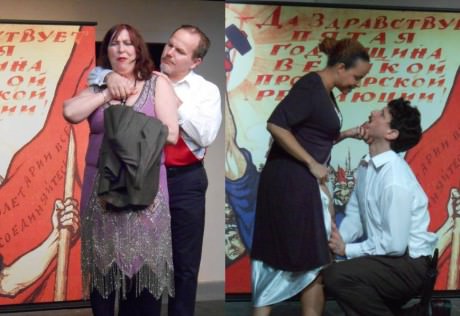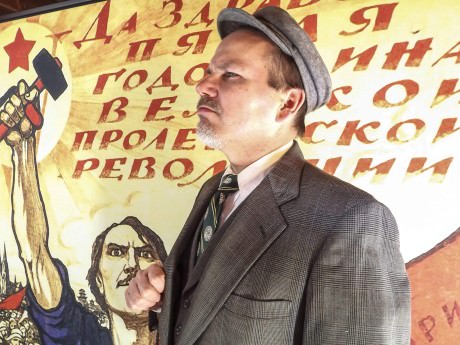Julius Caesar seems to be always with us. High school Latin still features Caesar’s Commentaries. Once there was a Russian Tsar. Now there is an Ebola czar. Caesar appears on Pinterest, Tumblr, and multitudes of Internet memes. Some e-cards notes “Just a heads-up that I have no intention of stabbing you 23 times on the Ides of March.” A distraught young woman pleads “We should totally just stab Caesar!” Perhaps it is time to admit that he is inevitable, like death, taxes, and Santa Claus.

The Rude Mechanicals have a unique take on Caesar; he is just like (wait for it) Lenin! In this iteration, Brutus becomes Trotsky and Octavius, a young Stalin. This production is an alternate history, set in 20th century Rome with echoes of the Soviet Union after the revolution. There are female soldiers; Cassius (Rebecca Speas), Mark Antony (Jaki Demarest, who also directs), and Casca (Lisa Hill-Corley). The crowd, i.e. the Roman populace, sits in the front seats and yells its head off for Caesar or Brutus, depending on who’s agitating and why. Caesar (Alan Duda) comes across as a somewhat courtly mob boss, surrounded by adoring women. Octavius (Holly Trout) is a combination of cold killer and femme fatale. Brutus (Joshua Engel) is just another thoughtful intellectual, wondering what it all means and oh, by the way, plotting to kill Caesar.
The key to this production is the performances, and the commitment of the actors is exceptional. Alan Duda is a startlingly effective Caesar, and his evil scream as his ghost appears to Brutus is one of the most riveting moments of the evening. As Brutus, Joshua Engel renders a fine account of a man who is torn between his idealism and his baser impulses. Rebecca Speas’ Cassius is full of conviction and fire; there is no doubt that this Cassius will win over Brutus to his (or, in this case, her) side. Jaki Demarest is a formidable Mark Antony, and her speech after Caesar’s death (“And Brutus is an honorable man”) is both a moving portrait of a woman mourning her friend, and a rousing call to action for the citizens of Rome. Lisa Hill-Corley is excellent as Casca; her matter-of-fact urgency and singularity of purpose make her an ideal co-conspirator for the fierce Cassius. As Octavius, Holly Trout is appropriately devious and menacing, suggesting that, like Stalin’s, her reign of terror will be profound and excruciating.
It is heartening to see so many women playing Shakespeare, when traditionally there are so few women’s parts. Here, Boneza Hanchock is a lovely Portia, and her speech about her fear for her husband is sensitively and beautifully drawn. As Calpurnia, Mikki Barry portrays a devoted wife, full of foreboding with a tender grace; her sadness as she stands by Caesar’s corpse in a wheelchair is especially touching. Moira Parham (Metellus Cimber), Melissa Schick (Trebonius) and Sam David (Cinna the Conspirator) give purposeful and focused performances.
Will Robey hits just the right note as Cinna the Poet, and his death is one of the most chilling scenes in the production. Sidney Davis (First Citizen), Andy Bakry (Second Citizen), Julia Pfanstiehl (Third Citizen), Leanne O’Neill (Fourth Citizen), Carol Calhoun (Fifth Citizen) and Michael McCarthy (Sixth Citizen) all contribute to the energy and brio of the production.
One of the best aspects of the staging is the use of the crowd. They chant “Caesar! Caesar! Caesar!” They react viscerally to whatever they see on stage, and are swayed 180 degrees by the dueling orations of Brutus and Antony.

A few caveats; to have Brutus be the one who tricks Caesar into going to the Forum doesn’t seem to work; such obvious tactics take away from our image of Brutus as the one conspirator with principles. In addition, this Brutus seems to have already decided to kill Caesar at the very beginning; the manipulation of Brutus’ vanity, and his journey to the final decision to kill, are part of why we want to watch Brutus. Because, for example, Brutus’ speech about assassination (“Between the acting of a dreadful thing and the first motion, all the interim is like a phantasma, or a hideous dream.”) comes in the very first scene, his through-line as a character becomes somewhat confusing.
Still, Director Jaki Demarest has created a unique, thought-provoking version of one of Shakespeare’s best plays. If at times it veers towards the outlandish, the production is always surprising and dynamic. The danger inherent in revolution, and the torturous intimacy of the relationships, are palpable, and, along with the power and beauty of the language, remind us what a great play this truly is.
Sound Design (Eric Honour) is among the evening’s greatest pleasures. As we enter, we hear scratchy revolution-type songs, and towards the end as the vision grows more somber, deeper, more mourning notes intrude. Lighting Design/Greenbelt Arts Center, by Eric Gasior and Liana Olear, has some unusual and striking effects, such as the flickering of lights in the beginning, and the darkness as Brutus encounters the ghost of Caesar.
Costumes by Trevor Jones have variety and style, and visually add to the Bolshevik revolution theme. Rebecca Speas creates many unusual Special Effects.
Brutus’ desire to kill Caesar is really a contemplation of patricide; there were rumors in Caesar’s lifetime that Brutus was actually Caesar’s son. Such themes are primal, and they never fail to grab an audience. This cast commits thoroughly to the play, and rides it valiantly to the finish. If you are looking for edgy Shakespeare, relax and enjoy the ride.
Running time: 1 hour and 45 minutes, with one intermission.
Julius Caesar plays through Sunday, January 11, 2015 at the Greenbelt Arts Center – 123 Centerway – in Greenbelt, Maryland. Tickets can be purchased by calling the box office at (301) 441-8870 or purchasing them online.
Julius Caesar also plays January 16-24, 2015 at the Howard County Center for the Arts—8510 High Ridge Road – in Ellicott City, MD. Tickets can be purchased at the door or in advance online.
Rating:




